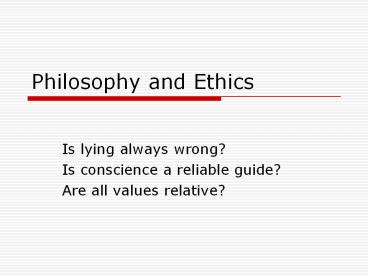Philosophy and Ethics PowerPoint PPT Presentation
1 / 13
Title: Philosophy and Ethics
1
Philosophy and Ethics
- Is lying always wrong?
- Is conscience a reliable guide?
- Are all values relative?
2
The Ethical Continuum
Situationism
Utilitarianism
Rational Choice
Egoism
Objectivism
Cultural Relativism Subjectivism
Absolutism
Relativism
3
(No Transcript)
4
Subjectivism
- All values are relative.
- Existentialist Perspective
- I make my own good no one can judge.
- Language Theory
- Moral terms are personal, individual.
- My logic determines my truth, and its mine.
- My statements can be tested as true or false.
- Most value statements are nonsense, because they
are value-based. - Therefore we cannot argue them.
- But how do we resolve differences?
5
Cultural Relativism
- Whatever a culture believes is good is good.
- Social authority determines good.
- There are few or no values that are universal.
- But what if a cultural belief is based upon a
falsehood? - What if my value is not good for me?
- How do we then make laws?
- Are we to tolerate sadistic evil and genocide
because it is a cultural value somewhere?
6
Egoism
- Psychological Egoism (Epicurus)
- All acts are motivated by self-interest.
- It is human nature to seek self-interest.
- It is impossible to be unselfish.
- Ethical Egoism (Ayn Rand)
- Each person ought to act in his own
self-interest. - Enlightened Egoism (Hobbes)
- Do both of the above, but without narcissism.
- Are there no selfless acts?
7
Objectivism
- Values exist outside of human reality.
- Absolute values are morally binding to all
humans. - Divine Command Theory
- We ought to follow self-evident truths
- Natural Law
- It is our duty to act on rational, categorical
imperatives. - The Forms of the Good (Plato)
- Beauty, Truth, Justice
8
Utilitarianism
- What is good is what produces the greatest
happiness for the greatest number of people. - The balance of pleasure and pain must be weighed
against alternatives to action - All value claims must stand the test of
consequences. - But what if the good of the mass obligates us to
harm the individual?
9
Situationism
- Love is the only absolute value
- All other values are based on the situation each
of us is in. - Morality therefore is in a constant process of
change.
10
Possible Combinations
- Rational Choice
- A rational person can choose right living if she
is free, impartial and informed. - People in this state will naturally have right
views and intentions. - People in this state will choose right speech,
actions, and livelihoods. - People in this state will conduct themselves with
right effort, mindfulness, and concentration.
11
Virtue Ethics
- What are the traits of a good person?
- How are these traits cultivated?
- What are the moral categories that define the
good person? - What virtues will allow me to function as a good
human being?
12
Feminist Ethics
- Do women operate uniquely from the domain of
morality of responsibility? - Psychological logic of relationships?
- Caring
- Do men operate uniquely from the domain of
morality of rights? - Formal logic of justice.
- Can there be an ethic for both?
13
Essential Questions
- Does the individual or the group deserve greater
weight? - Is the good of all persons to count equally?

